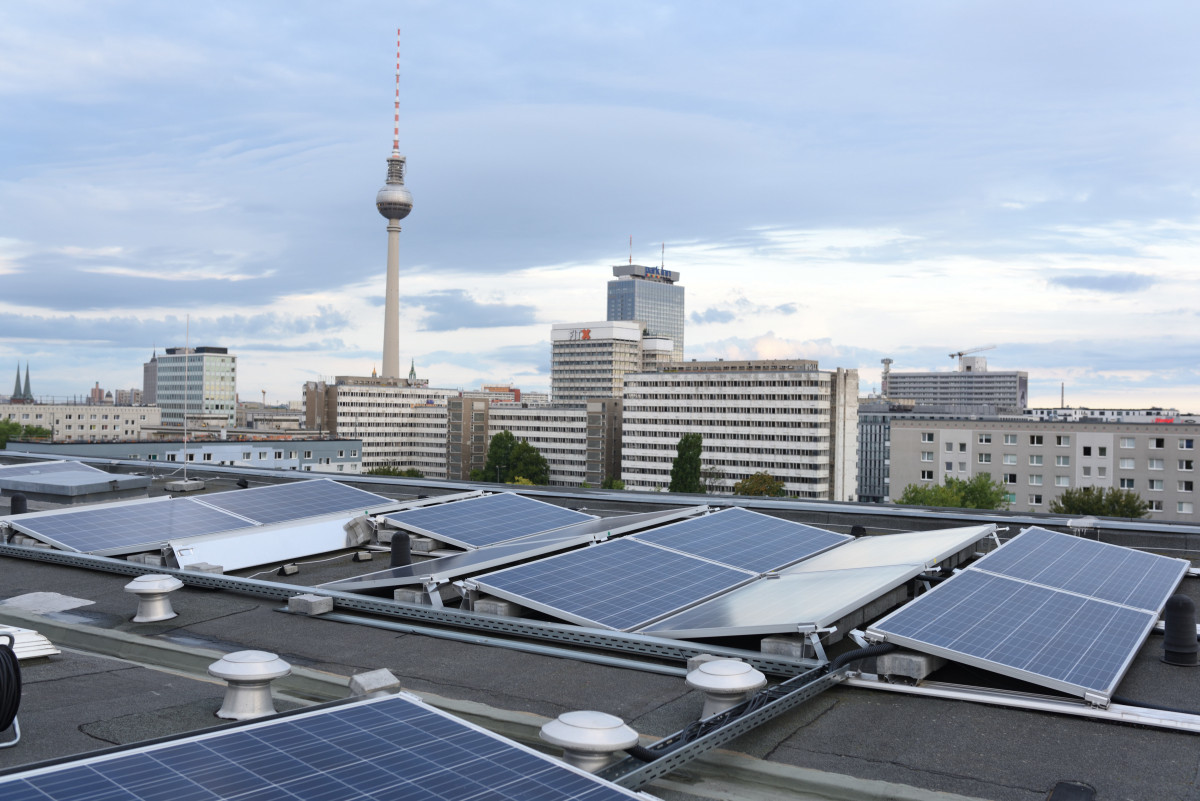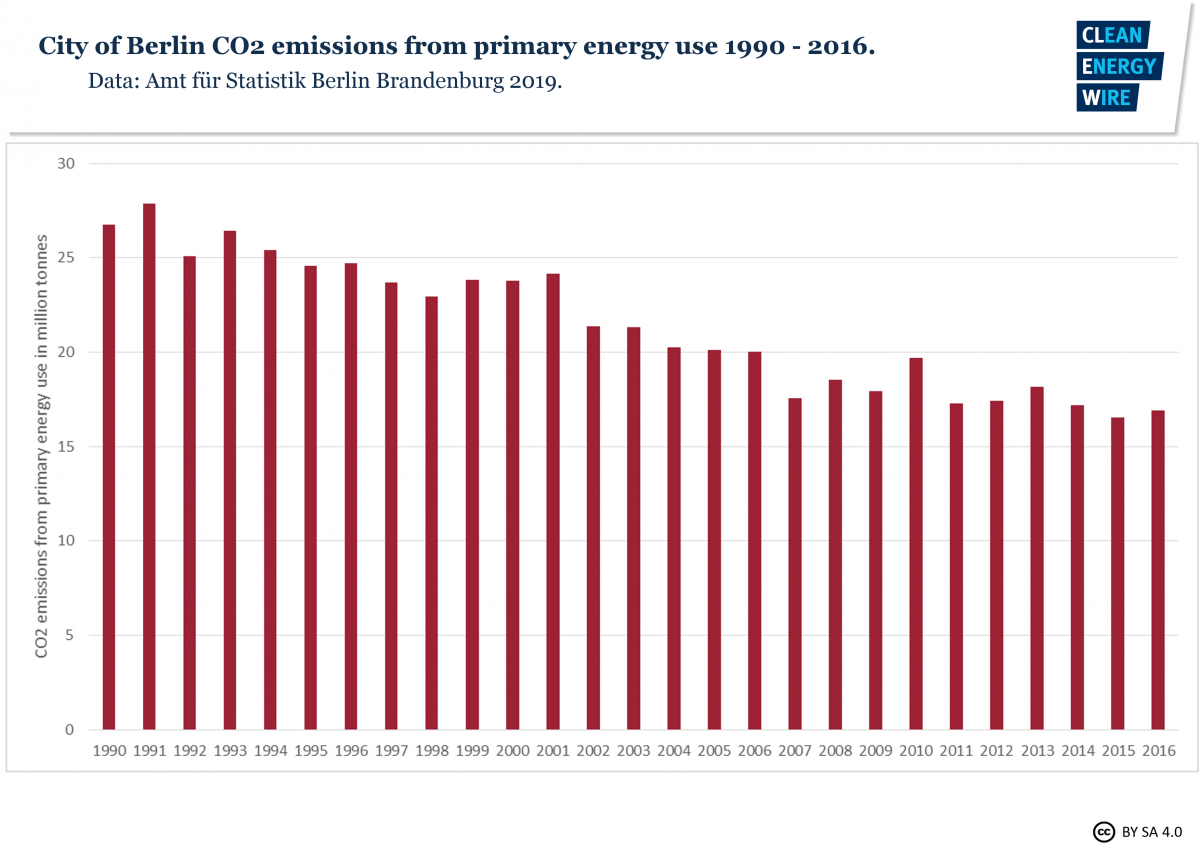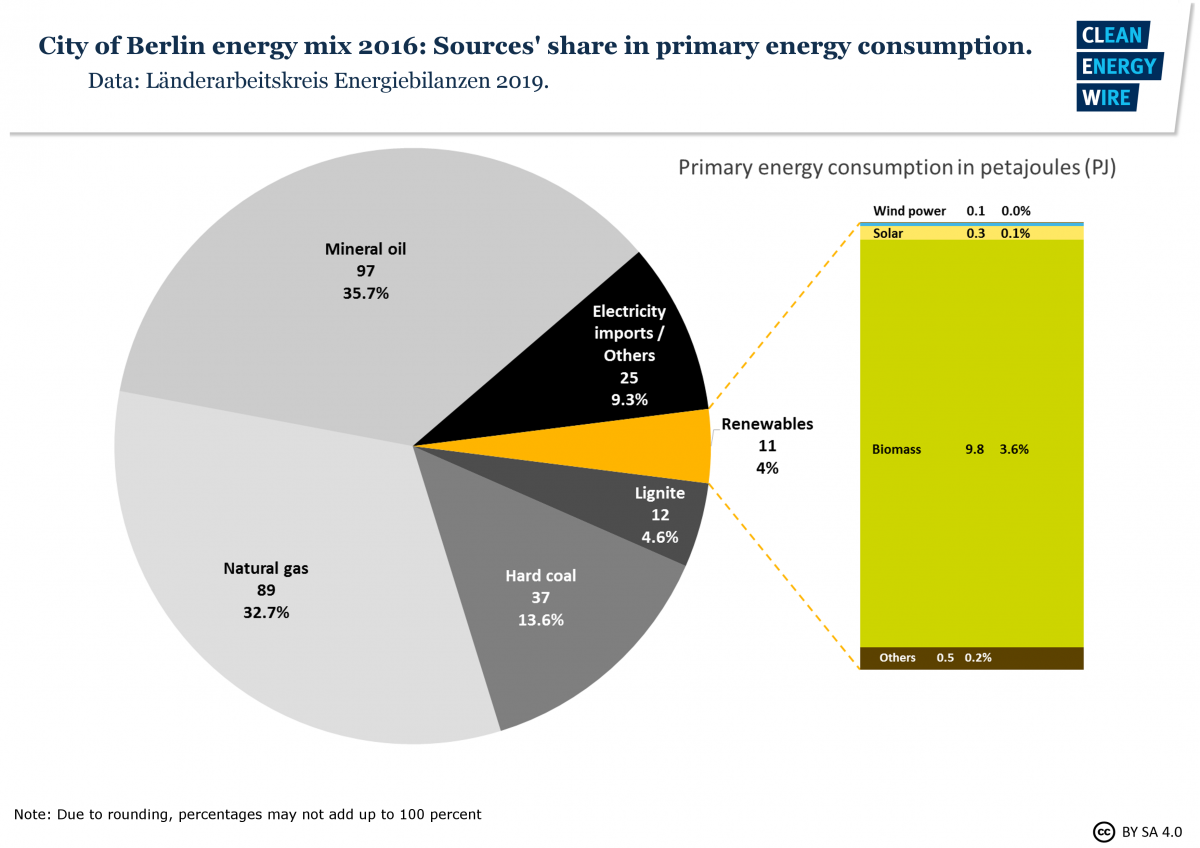While Germans wait for federal climate action, Berliners call for climate emergency
As tens of thousands of young people and their adult allies gathered every Friday in Berlin this past spring, activists wandered through the crowds with petitions, pens and a simple demand: Declare a climate emergency in Berlin.
Organisers were hoping to collect the required 20,000 signatures for the Berlin House of Representatives to publicly deliberate on the civic initiative and conduct hearings - they exceeded their goal and gathered more than 43,500 signatures, which are now in the process of being verified.
The Berlin climate emergency initiative calls for a city-wide speed limit of 30 kilometres per hour, a purely meat-free service in canteens and dining halls and significantly higher take-off and landing fees at airports.
Tine Luge, a mother of two who signed the petition at a Fridays for Future demonstration, told Clean Energy Wire that "Realistic or not, in the end it depends on the willingness or the pressure to act. I think Berlin should set an example as the capital."
Tizia Labahn, spokesperson for the Green group in the Parliament in Berlin, one of three parties in the Berlin coalition government told CLEW: "While we approve of the climate emergency, it has been clear to our party for years that we have a climate crisis. We are pleased with Fridays for Future and the societal trend of climate awareness, because finally climate protection is on the agenda all over the world.“
Already more than 40 German municipalities have declared a climate emergency, including neighbouring Potsdam (in the state of Brandenburg) and Pankow, a northern district of Berlin.
In Constance, southern Germany, the first city in the country to declare such an emergency in May 2019, the initiators of the climate emergency demanded new bicycle paths, better public transport and stricter requirements for construction projects. The mayor there has even given up his staff car to show his commitment.
Worldwide, 1,008 jurisdictions in 19 countries have declared a climate emergency.
Lighting a fire under Berlin's existing climate policies
While an eventual climate emergency declaration would not have any legal recourse in Berlin, it would pressure the city's government to consider CO2 emissions a dire problem.
Berlin, which - hit by record heat waves - endured the hottest temperatures during the last two summers among the German states, plans to reach climate neutrality by 2050. Mark Dörre, initiator of the climate emergency initiative in Berlin, said that declaring such an emergency would be “20 years too late." Elsewhere in Europe, Amsterdam plans to reduce emissions by 40 percent by 2025 and Copenhagen by 100 percent by 2025.
Germany's capital city is often criticised for an inefficient administration after decades of public spending cuts and ridiculed for its inability to finally complete and open its seven years overdue airport. Nevertheless, the city has no shortage of laws on environmental sustainability, some of which sound similar to the measures entailed in the climate emergency declarations around the country.
For example, Berlin was the first state to create its own mobility law, which promises improvements in all modes of sustainable transportation - walking, cycling, public transport and car sharing. It stipulates the introduction of more commuter rail routes, cheaper commuter fares (starting this autumn, school students can already travel by public transport for free), fast cycling lanes for commuters, and electric buses.
Berlin's department for the environment prides itself on the fact that emissions have gone down considerably since 1990. They have declined 36.8 percent by 2016, according to the Statistical Office for Berlin-Brandenburg. But compared to the "previous year" (2015), "CO2 emissions based on primary energy consumption actually rose by 2.4 percent" in 2016, the office said.
"If I don't file a tax return as an entrepreneur for three years, how quickly do you think the tax office would be at my door?" Milena Glimbovski, owner of the Original Unverpackt (originally unpackaged) shop in Berlin and head of one of 22 organisations supporting the climate emergency initiative, told the daily taz. "It is absurd that Berlin does not present any current emission figures." The statistical office said the delay was due to difficulties in collecting data from different agencies.
The last year for which emissions figures are available in Berlin - 2016 - is the same year when Berlin's pro-energy transition government - a coalition between the Social Democrats, Greens and the Left Party - took office and when the Berlin Energy Transition Act came into effect to "make Berlin's climate targets legally binding."
The law sets the framework for Berlin’s climate protection and energy policy and stipulates that carbon dioxide emissions must be reduced by 40 percent by 2020, 60 percent by 2030 and by 85 percent by 2050, all compared to 1990. The decommissioning of Berlin's remaining lignite-fired power plants also took place under this law in 2017. A complete end to coal use in Berlin is planned by 2030.
The most recently added part of Berlin's climate strategy is the city’s Energy and Climate Protection Programme 2030, which Berlin's department for the environment calls its “roadmap” towards climate neutrality. Adopted by Berlin's House of Representatives in January 2018, it contains strategies and measures for energy supply, buildings and urban development, industry, traffic and private households.
But Berlin's emissions are decreasing too slowly, according to studies, which is why the city is unlikely to reach its 2025 targets, according to the Chamber of Commerce and Industry's Green Economy Index Berlin 2025.
Emissions are still too high in the non-power sectors. Berlin's population of 3.7 million mostly lives in apartment buildings, which account for half of the city's CO2 emissions. Coal-fired energy supply is still substantial in Berlin, making up 18 percent of the total energy mix in 2016. Only four percent of electricity came from renewable sources.
"The figures for the share of renewable energies and building efficiency are not very encouraging. In terms of building efficiency, consumption is even taking an unsustainable path. […] The recycling economy, which is central to the Green Economy, is still developing too slowly. […] The mobility indicators continue to indicate a need for action," according to the Green Economy Index.
In other words, the index -- which also notes positive developments, for example that photovoltaics, heat pumps and final energy productivity are on the rise and that water management increased from 69 to 83 percent -- notes that "this development must be sustained and, in many areas, significantly accelerated."
The organisers behind the climate emergency initiative have a similar message. "A climate emergency would intensify the climate priority in Berlin," Christoph Rinke of Bürger Energie Berlin told CLEW.
Opposition in the House of Representatives is not convinced that the emergency declaration is the solution to Berlin's climate issues. "We have to do climate protection, not proclaim it," said Danny Freymark, environmental spokesman for the Christian Democrats. His party has suggested planting more trees and focusing on rainwater and waste management.
On 20 September in Berlin, the federal coalition government will deliver its promised climate action package to meet the country's 2030 climate targets. Fridays for Future strikes are planned in Berlin, as well as in 300 cities across Germany.




